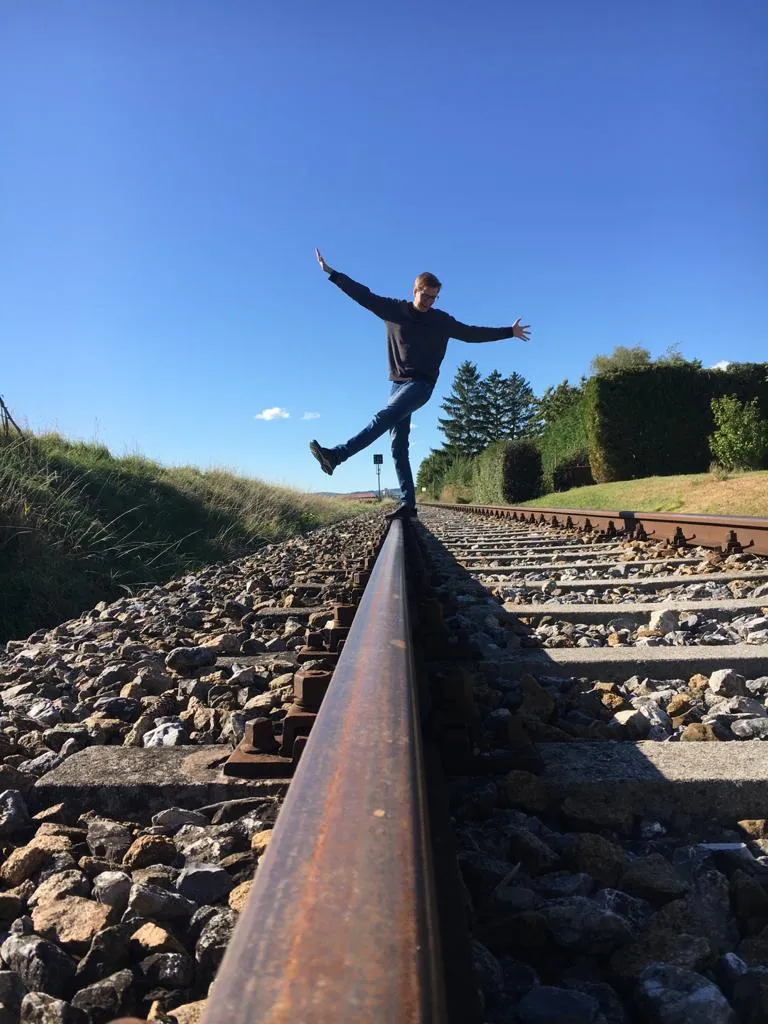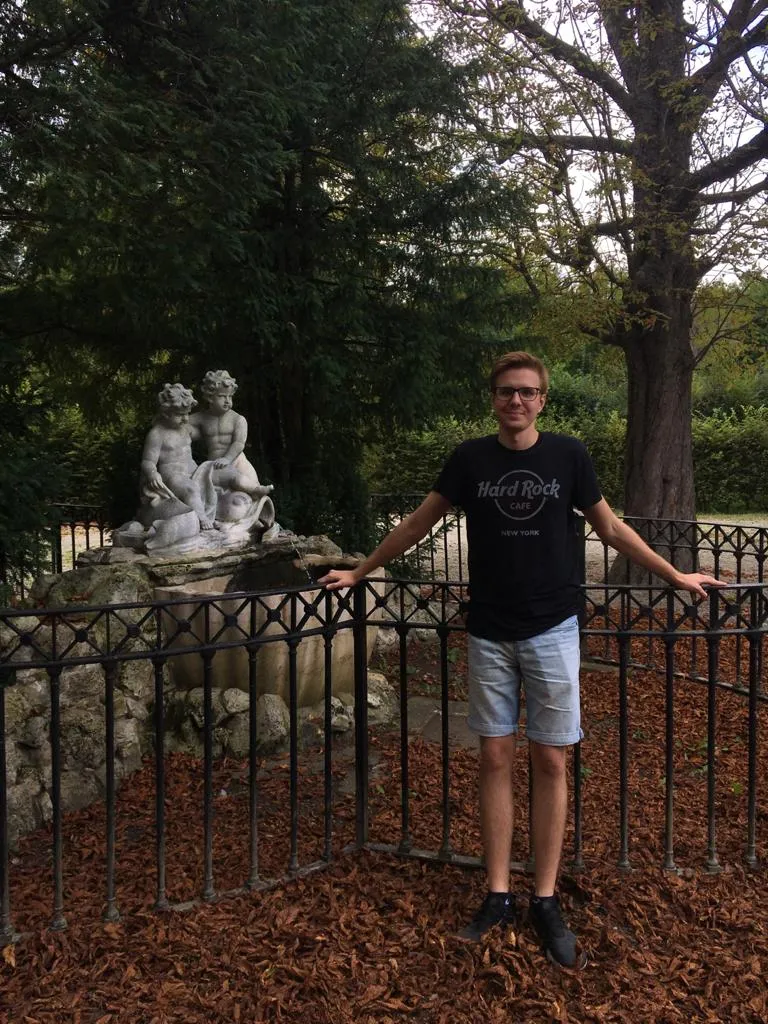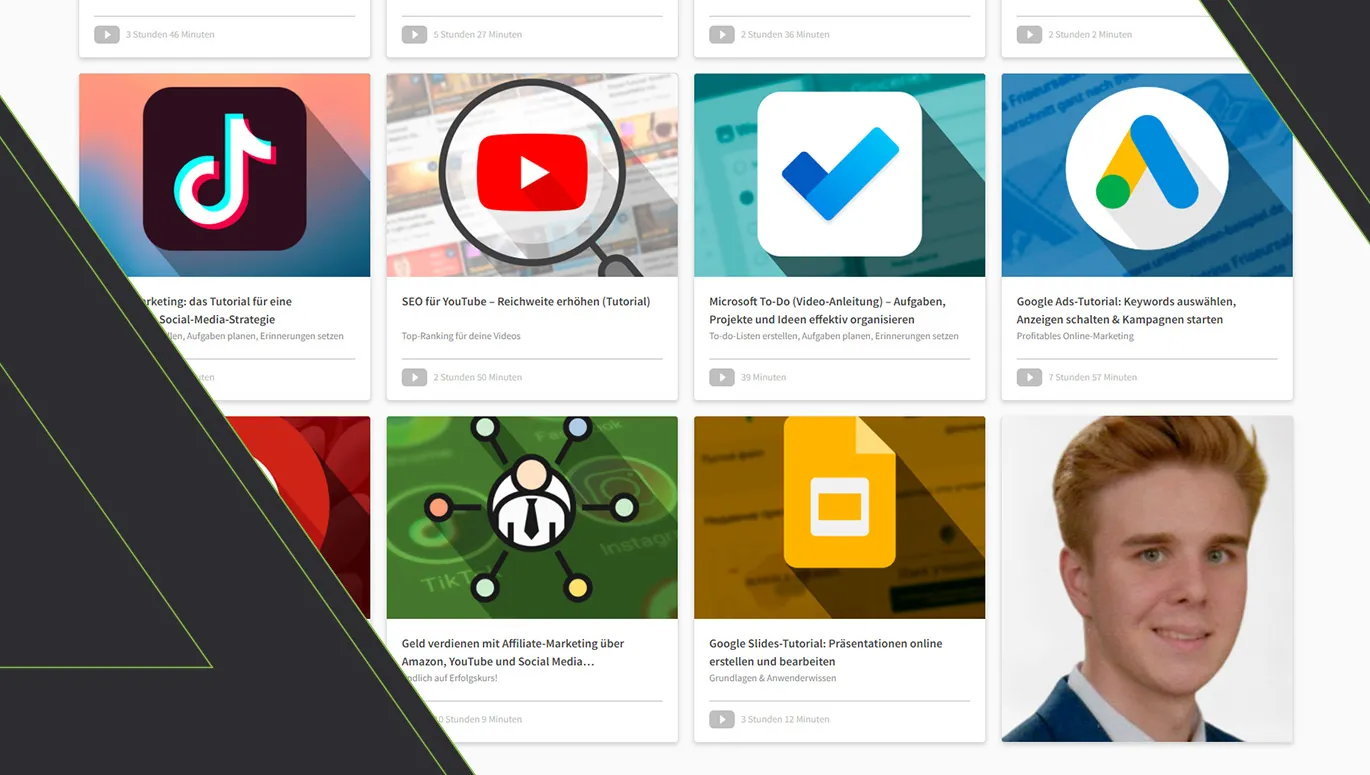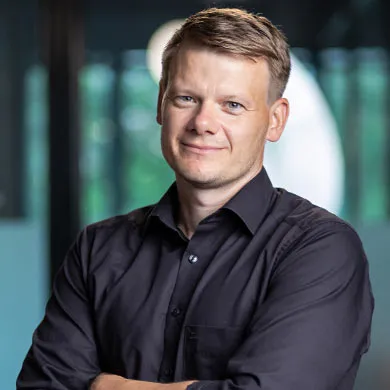Why it's worth reading an entire bookshelf during your community service? Why it's better to sit in front of a camera than in a pub? Why believing in your own success can't start early enough? Tobias Becker, video trainer at TutKit.com with a great instinct for digital marketing, answers this and much more in our big interview.
A brief portrait of Tobias Becker
Austrian Tobias Becker (21) is successfully active in online marketing. As a video course instructor, he shares his expertise in the areas of entrepreneurship, social media marketing and investing in in-depth tutorials on TutKit.com. He is also studying business administration in Vienna with a focus on finance and digital marketing. He also runs a YouTube channel on the subject of shares and shows you how to make your money work for you successfully.
About the creation of tutorials and the urge for versatility
What equipment do you use for your screencasts?
For my videos, I use a studio microphone, a webcam, a green screen and free recording software on my computer. I also had my own softbox made, which illuminates my face and body perfectly during the video recording. For YouTube videos, I also have a small camera that I mount on a tripod for special shots.
How many attempts do you need until a video is in the can?
Actually, I never need more than 2 attempts for a finished video. However, I have to say that I sometimes have to make a lot of cuts within the videos and sometimes pause the recording to reorganize myself. However, I still prefer to make several cuts within the video than to recite my text twenty times from the beginning.
Has anything ever gone wrong during a recording? If so, what?
It's not unusual for me to sit down at the computer early in the morning, start a recording but forget to switch on my microphone. Then I always have one or two recordings that run without sound. Of course, I then have to record them again.
Otherwise, there are very few serious errors. It only happened to me once that I recorded a ten-hour video course and I didn't realize that you can only hear the sound in one ear for the most part.
Is there a secret Tobias Becker 2.0 who helps you with your preparations, or do you manage your training courses all by yourself?
At the moment, I script all my videos myself. I also record them myself and edit them afterwards. This means that the entire process is currently in my hands. I've often thought about outsourcing. Unfortunately, I have to admit that even transferring the raw files to the outsourcing partner would take so long that I could edit the videos myself. It's also a welcome change to save my voice before going to bed.
In addition to my coaching activities, I also run a financial blog on Instagram and YouTube. In the summer, I finally hired someone to take care of my Instagram profile. Apart from that, I do everything myself in this area too.
You have an Instagram account and a YouTube channel where you show people how to invest their money successfully. How did you come to do that?
I run the Instagram account and the YouTube channel mainly out of personal interest and because a few years ago I was still sitting in the library without much knowledge of finance.
You're very well-versed. Where do you get your knowledge from?
I absorbed a lot of content on the topic of "earning money online" at a young age and also tried out lots and lots of things. For example, I started with the well-known T-shirt business Print-On-Demand and this business model led me to Amazon KDP, where you can write and sell your own books.
These projects are still running in the background and generating revenue. However, the fun was much more important to me than the income at that time, so I changed my focus and looked for other methods. This led me to Instagram and YouTube, which has now also become more of a hobby. These experiences gave rise to the "Earning money" training courses.
My video courses on the topic of "marketing" have mainly resulted from my social media activities, but also from my studies. I am studying business administration with a focus on marketing and digital marketing, which means I am optimally trained in these areas. I also started a specialization in finance, as I felt it would improve my knowledge of finance and stocks.
The training on general programs - such as Paint or Office products - came about simply because I use them every day and have mastered them accordingly.
What is your absolute favorite topic from your trainings?
It's definitely Instagram, which you can clearly see from the length of the course. The Instagram course is currently my second-longest course with 22 hours of video material and is constantly being revised. However, I have to admit that my very first training course from 2019 on Amazon KDP makes me very proud and I'm pleased that it's still generating revenue. However, it also makes my hair stand on end a little when I compare the quality back then with the quality today.
Tutorials by Tobias Becker for successful social media marketing
Becoming and growing as training for the future
Today you live and study in Vienna. Were you born there or is it your adopted home? Tell us a bit about your origins.
I was born in Vienna and it is also my adopted home. I've lived in the Austrian capital since I was born and feel very much at home here. However, for a few years now I've been toying with the idea of going abroad for a short time. That means I might go on a trip around the world for a year after my Bachelor's degree or take more frequent trips to countries I don't know yet.
What was your career aspiration when you were ten years old?
That's a very good question. When I was ten years old, I probably wanted to be a firefighter or a policeman. But I can't remember that exactly. I only know that I wanted to be a chef when I was 15 or 16. But then I buried that idea again when I heard that you also have to dissect and prepare fish, and I don't like eating fish.
I don't think I ever really had a concrete career idea and I still don't. That's why I take a relatively relaxed approach to the subject of careers.
What did you do after leaving school and how did you get into it?
After I finished school, I had to do community service. I did my national service there for nine months. At that time, I started to find ways to earn money. In general, it occurred to me at the time that there might be other ways to make a living besides the traditional employment relationship.
What motivated you to do what you do today? Was there a special moment?
As I said, I did my community service some time ago. As the pay there was relatively low, I started reading articles online in the first week to get ideas on how to earn money on the side. At that time, I was still toying with the idea of studying business law.
I discarded this idea during my community service and decided to study business administration. The tasks during my civilian service were so thankless that I read one or two books on finance a week in my free time to further familiarize myself with the topics of "earning money", "self-employment" and "entrepreneurship". By the end of my civilian service, I had more or less read the entire finance section of my home library.
Incidentally, I also came across the topic of "earning money online" and "trading", which ultimately led me to the topic of "long-term wealth accumulation and investing in shares", which is still an integral part of my life today.
How do you envision your future? Would you like to remain a trainer? Start your own company? Or would you prefer to go into business administration?
That's a very good question that I can't answer straight away. I'm currently in the last year of my Bachelor's degree. I can well imagine remaining a "full-time trainer" for some time afterwards. Or, as already mentioned, to go abroad for a while.
However, my plans often change more often than I would like. For example, I started my studies with business law, then soon switched to business administration, where I started specializing in finance. Until I realized that I enjoyed marketing - especially digital marketing - much more than traditional accounting.
I can very well imagine having my own company in the long term, as I would describe myself as very creative yet analytical. I'm currently thinking of setting up my own online academy. It should specialize in the field of marketing. Only on a small scale, of course. But in the future, it could develop into my own marketing agency.
But I can just as well imagine that once all these projects are running by themselves and I no longer have to be behind them all day, I could work 10 to 20 hours a week in marketing for a large company. Examples of this would be Coca-Cola, Starbucks or Unilever, which fascinate me both from a shareholder and customer perspective. In the long term, I can't currently imagine working 40 hours a week as an employee.
Have there been any mistakes that you regret today?
I can say this much: I make an incredible number of mistakes every day. That's why I'm even happier to have the privilege of earning my own money and not having someone constantly looking over my shoulder and checking up on me. If these mistakes were to become apparent in a company, I would probably lose my job very quickly.
In my self-employment, I have the advantage that I can simply correct the mistakes without anyone noticing. I haven't made any big mistakes in my life. However, as I said, I make a few small mistakes all the time. Of course, they could be avoided, but if it were that easy, I would avoid them too.

The inner drive to surpass yourself
Where do you get your discipline from? What drives you?
I would say that I have always been a very disciplined person. But in the current phase of my life, I'm motivated above all by the fun and pleasure I get from creating products and from my work itself. Although I have to admit that I'm not always full of discipline and motivation either.
Who or what inspires you the most?
Funnily enough, I don't have a specific person that I look up to or admire. For me, it's rather a lot of things that together make up a strong person. For example, working tirelessly on something and then seeing success when, after 10 to 15 years of hard work, you realize that you've finally been rewarded for everything you've toiled for over the last few years.
One example that comes to mind is the German rapper Sido, who started recording music several years ago out of a passion and is now one of the best-known German musicians.
What achievement are you most proud of?
The fact that I have now achieved the goals I set myself during my community service and have already set myself many times higher. I myself can see the progress I'm making on the university campus: two years ago, when I started my studies, I went to my first lectures with 300 Instagram subscribers, focused on my cell phone. Today, I have almost 10,000 Instagram subscribers, a YouTube channel with almost 2,000 subscribers and am one of Austria's most successful online lecturers. When I think about moments like these, it makes me a little proud - although I'm still a long way from where I want to be.
Studying and coaching, how do you juggle the two?
I hear this question a lot. But I've never asked it myself. At the end of the day, life is all about attitude and expectations. So if I start the day with the mindset that I'm going to push ahead with both my studies with acceptable grades and my self-employment with increasing income, then it works.
If, on the other hand, I insisted on only achieving very good grades in my studies, then my day would probably be filled with nothing but studying and I would have no time for the important things in life. So I probably place less value on grades than other fellow students, and of course that helps to free up a bit of time.
I'm also not the type to go clubbing at the weekend or particularly enjoy drinking alcohol. While others end the evening with an after-work beer with their flatmates, I sit at home and edit videos. That might sound a bit sad at the moment, but it's probably much healthier in the long run.
What is your balance to your working day?
I have a girlfriend who I would describe as my balance. Without her, I would probably work far too much, which would significantly reduce my productivity. So I'm very happy to have her. I also enjoy going out to eat, but I also do sports from time to time - such as playing badminton or bouldering, although unfortunately I don't get enough exercise.

Experimental daily routines and why hobby and job belong together
Do you ever take a break? What do you do in your free time?
Unfortunately, I have to admit that I'm still not particularly good at disconnecting my mind from work for a while and simply taking a break. I definitely need to work on that. In my free time, I really enjoy doing things with my family. I also like to analyze stocks for a living so that I can buy them for my portfolio if necessary. I think I've always indulged in this habit in some way. I used to collect Pokémon and Yugioh cards. Today it's shares.
What does your morning routine look like?
I would love to tell you about the perfect morning routine. But unfortunately I don't manage it at all any more. Last year, I dared to experiment and got up at 4:30 a.m. every day to tick off the most difficult tasks early in the morning. Unfortunately, I found that although my productivity was significantly higher in the morning, I was already exhausted and tired by lunchtime.
These and similar experiments have shown me that although a morning and evening routine are important and that tips such as "Get up early", "Do the most difficult task of the day first" or "Take a cold shower" can also be very useful, none of this really has much to do with your success.
And a normal daily routine?
You have to make a big distinction between days when I have lectures and days when I'm more or less free. On lecture days, I sit nervously in the lecture hall and then sprint home and get down to work with enthusiasm.
On days when I don't have a lecture or during the summer vacation, I work in blocks. This means that I plan my tasks in such a way that I can complete them in three different work blocks throughout the day. There are days when I sit in front of the PC from 6 a.m. to 10 p.m. and record videos, edit them and do other tasks. And then there are other days when I say after just four hours that I've had enough for today.
You are still a relatively young coach. Do you sometimes struggle with a lack of acceptance?
At the time of the interview, I was still 21 years old. But I haven't actually experienced a lack of acceptance yet. This is mainly due to the fact that most people first watch my videos or video courses and only then form an impression of me.
And because I create my productions to a very high quality, I tend to get more encouragement than a lack of acceptance. However, I have gotten out of the habit of mentioning that I am still a student. That usually brings negative preconceptions with it.
What is your passion?
I've asked myself this question a lot, but unfortunately I haven't come up with a clear answer. However, I would say that I really enjoy video production in general, regardless of whether it's YouTube videos, video courses or simply hobby projects. And that I can imagine doing it for a long time to come.
Tutorials by Tobias Becker on useful Office applications
Curiosity about Play
Would you like to get your own impression of Tobias Becker and his passion for instructive video projects? Then follow our video trainer to his large collection of tutorials.

